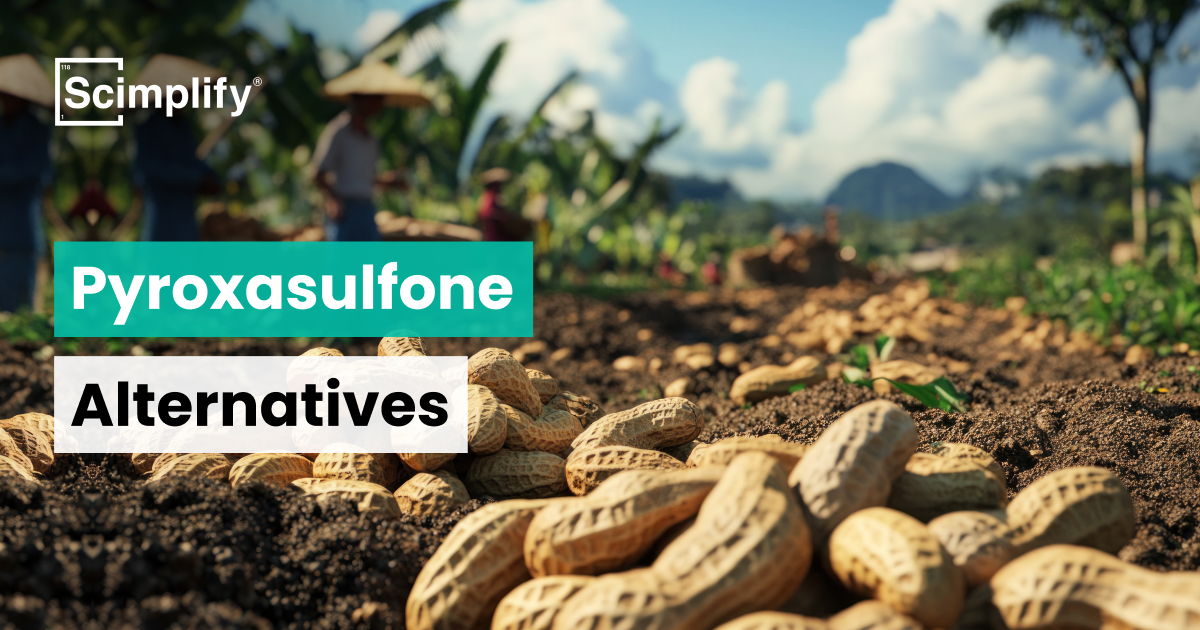Pyroxasulfone alternatives- Pros and Cons
Pyroxasulfone is a pre-emergent herbicide used in crops like corn, soybeans, and wheat for long-lasting control of tough grasses and broadleaf weeds. Favoured for its residual strength, it must be applied carefully to avoid resistance and environmental impact.

Pyroxasulfone is a strong pre-emergent herbicide that works strongly against annual grasses and broadleaf weeds, because its high cost, soil persistence, and limited crop spectrum is less ideal for certain agricultural activities.
S-Metolachlor
S-Metolachlor is a chloroacetanilide herbicide inhibiting elongation of root and shoot cells in germinating seedlings ,and is widely used for pre-emergent control of annual grasses and small-seeded broadleaf weeds in crops like corn, soybean, cotton.
Pros:
- Broad-spectrum and flexible across crops
- Cost-effective compared to newer herbicides
- Long history of use with known performance
Cons:
- Shorter soil residual life than Pyroxasulfone
- Requires higher application rates
- Resistance is increasing in some weed species
Explore manufacturing and buying options for S-Metolachlor
Pendimethalin
Pendimethalin is a dinitroaniline herbicide that disrupts cell division by inhibiting microtubule formation. It is used extensively in wheat, rice, cotton, legumes, and vegetables for controlling annual grasses and some broadleaf weeds.
Pros:
- Very economical and accessible
- Effective in early-season weed control
- Useful in pulses and many vegetables
Cons:
- Weaker on herbicide-resistant weeds
- Requires incorporation or irrigation for activation
- Shorter persistence in soil
Explore manufacturing and buying options for Pendimethalin
Flufenacet
Flufenacet is a pre-emergent herbicide from the thiocarbamate class, targeting VLCFA biosynthesis, like Pyroxasulfone. It’s mainly used in wheat and barley to control blackgrass, ryegrass, and wild oats, often in combination with diflufenican or other actives.
Pros:
- Very effective on problem weeds in cereals
- Can be part of resistance management in rotation
- Works well in cold, moist soils
Cons:
- Narrow crop spectrum (mostly cereals)
- Moderately persistent in soil
- Limited availability in some regions
Explore manufacturing and buying options for Flufenacet
Prosulfocarb
Prosulfocarb is a pre-emergent herbicide that inhibits fatty acid synthesis. It is used in cereal crops and potatoes, especially in cool-season climates. It's often part of tank mixes for managing early-season weeds.
Pros:
- Great fit for cereal crops
- Helps manage resistance when rotated with other MOAs
- Offers good activity against chickweed and grass weeds
- Works well in colder weather zones
Cons:
- Can volatilize in high temperatures
- Not as effective on tougher weeds like barnyardgrass
- Requires careful handling to avoid drift
- Slightly higher dose requirements
Explore manufacturing and buying options for Prosulfocarb
Acetochlor
Acetochlor is another chloroacetanilide herbicide that interferes with protein synthesis and root/shoot development. It is popular in corn and sorghum, often in early post-emergence applications as well.
Pros:
- Excellent for early-season grass and broadleaf control
- Residual activity up to 6 weeks
- Commonly used in corn systems
- Mixes well with other herbicides for broader control
Cons:
- Regulated as a restricted-use pesticide in some countries
- Can contaminate groundwater if overuse
- Not suitable for many non-cereal crops
- Less effective on evolved resistant weeds like pigweed

